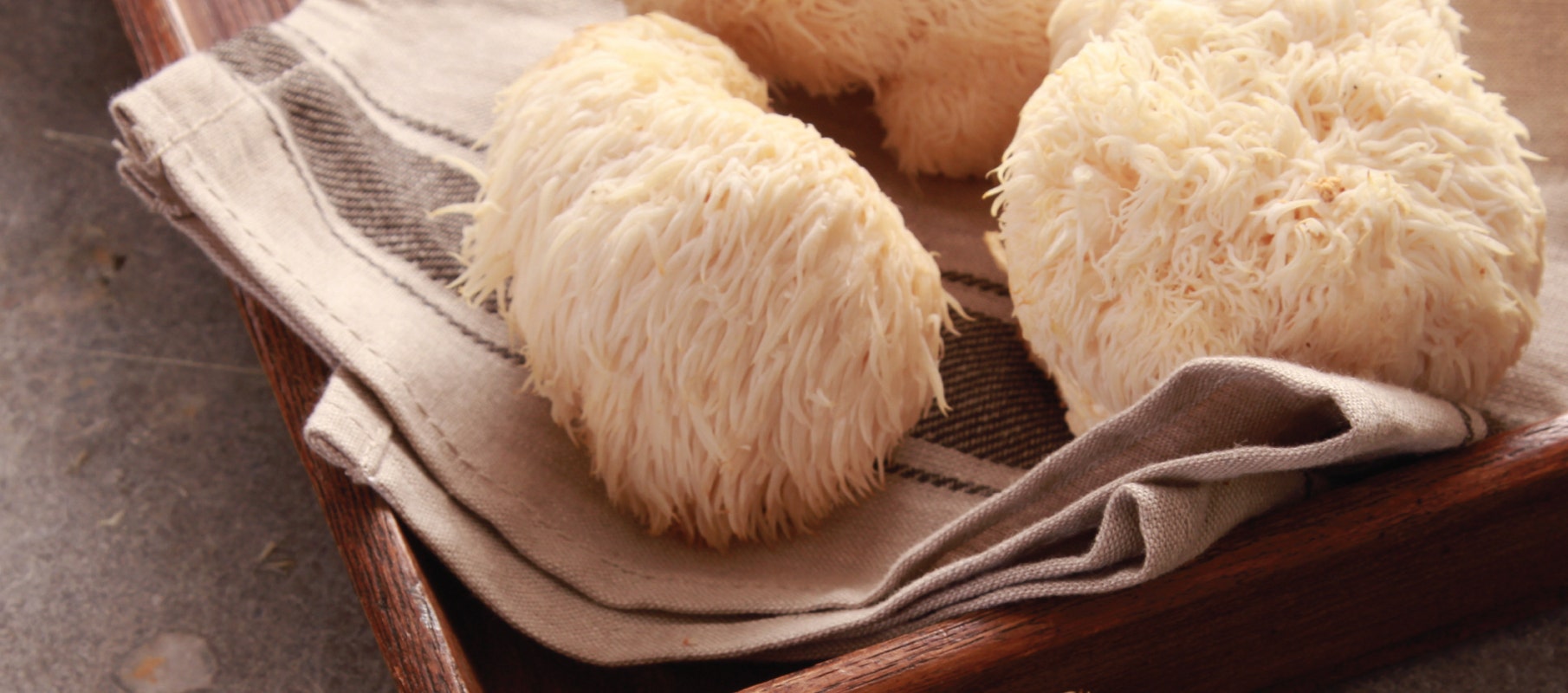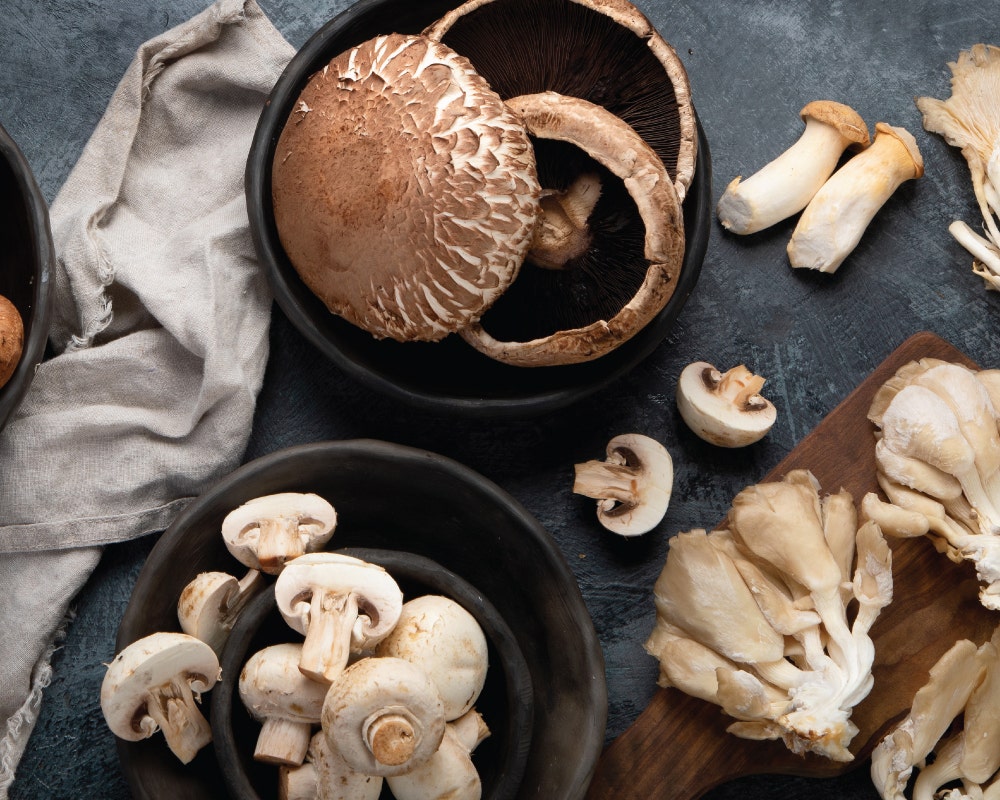Here’s Why People Are Adding Lion’s Mane
- 10/2/23


In the world of natural wellness, few items capture the “Alice in Wonderland” feel quite as well as the Lion’s Mane mushroom. With its shaggy white “mane”, this variety of mushrooms stands out among the fungal crowd.
But it’s not just its appearance that makes Lion’s Mane unique. From its place in ancient folklore to its history of use in traditional medicine, this fungi has lots to offer for the body and mind. In fact, it may be one of the best foods for brain health. Read on to learn all of the fascinating Lion’s Mane benefits.
What is Lion’s Mane?
Growing in the trunks of dead hardwood trees or the stumps of injured trees, you’ll find Lion’s Mane (Hericium erinaceus) mushrooms. You’ll know that you’ve stumbled upon Lion’s Mane first by its captivating appearance.
These large, white mushrooms grow icicle-like projections from their central body. As these projections become longer, they almost resemble a cute white earmuff or a shaggy Lion’s Mane — hence, the mushroom’s name. Other nicknames for this species include “bearded tooth fungus” and the “pom-pom mushroom”.
Lion’s Mane mushrooms are native to countries in Asia, including China, Korea, Japan, and India. In the wild, they can grow to be up to 10 pounds each.
While medicinal mushrooms are still gaining attention in Western countries, they have been used for centuries on the other side of the globe, both medically and in the kitchen.
Benefits of Lion’s Mane
If you’re wondering why Lion’s Mane mushrooms are becoming more popular, it’s because they have a number of health benefits, most of which are related to the brain. While more research on humans is needed, the current evidence behind Lion’s Mane benefits is intriguing.
Antioxidants
Antioxidants are predominantly plant compounds that help protect your cellular health. They work by neutralizing the effects of free radicals and reducing the potential damage they end up doing to cells throughout your body via oxidative stress. Free radicals are found in the environment, and the food you eat, and are even byproducts of your own metabolism — so antioxidant protection is key.
Recent research agrees that Lion’s Mane is a source of antioxidants that could help support overall wellness.
May Help Support Healthy Mood
Lion’s Mane mushrooms contain compounds that may be helpful for lifting mood. Some researchers think this is likely due to a combination of its ability to help target inflammation and act on the hippocampus, the area in your brain responsible for mood and emotions.
Most of the research on mood has been conducted using animal models.
May Help Support Heart Health
Heart health has been a top public health concern for many years. Factors like high blood pressure and high levels of blood fats are associated with an increased risk for heart disease. Finding ways to help support heart health has therefore been a top priority.
Some studies have found that compounds in Lion’s Mane may influence certain factors related to heart disease risk. For instance, animal research has observed that Lion’s Mane extract may help lower high triglycerides and support weight loss that supports heart health.
Test tube studies have observed that the extract can help prevent cholesterol in blood from being oxidized. Oxidized cholesterol molecules are more likely to attach to the walls of your arteries, promoting blockage and increasing the risk of a heart attack or stroke.
May Help Support Healthy Brain Function
Your brain is made up of millions of neurons, or brain cells that communicate through electrical signals and tell your body what to do. In order to support brain health, you need healthy neurons.
Some test tube studies have indicated that Lion’s Mane mushrooms contain certain polysaccharides, or carbohydrate chains, that help protect neuronal health and function.
Furthermore, unmanaged oxidative stress can have negative effects on brain health. Lion’s Mane may be one of the best foods for brain health as its antioxidants help protect brain cells from oxidative damage.
May Help Support Normal Blood Sugar Regulation
While studies are limited, some researchers think Lion’s Mane mushrooms may contain compounds that help support normal blood sugar levels and increase insulin sensitivity. Some animal research has found that Lion’s Mane extract could lower blood sugar and raise insulin levels among rats.
How to Use Lion’s Mane
Now that you know what Lion’s Mane may have to offer, you’re probably wondering how it can be added to your health routine. The good news is that Lion’s Mane benefits can be reaped from both supplemental and food forms.
You can technically eat Lion’s Mane mushrooms raw, although cooking them generally helps improve their texture and flavor, much like other species of mushrooms.
Furthermore, like all mushrooms, Lion’s Mane contains the fibrous substance chitin in their cell walls. This can cause an upset stomach when eaten raw and is reduced with cooking.
They’re known for having a bouncy, tender texture that works well as a plant-based substitute for crab or lobster. They have a lightly sweet flavor and a bitterness that can become more potent when cooked.
Some people like using them to make Lion’s Mane chowder or blending them into a sauce. You can also purchase dried Lion’s Mane from many Asian markets and rehydrate it for use in soups.
If you want a good Supplement for Brain Health, among other potential benefits, consider Lion’s Mane. This can be a more convenient way to get Lion’s Mane into your daily routine, especially if you don’t like to cook with mushrooms.
Overall, Lion’s Mane is a unique species of fungi with a promising list of potential health benefits to its name. While more human research is needed, adding it to your health regimen may offer benefits for your brain, heart, and overall wellness.
References
-
Abdullah, N., Ismail, S. M., Aminudin, N., Shuib, A. S., & Lau, B. F. (2012). Evaluation of Selected Culinary-Medicinal Mushrooms for Antioxidant and ACE Inhibitory Activities. Evidence-based complementary and alternative medicine : eCAM, 2012, 464238. https://doi.org/10.1155/2012/464238
-
Ghosh, S., Nandi, S., Banerjee, A., Sarkar, S., Chakraborty, N., & Acharya, K. (2021). Prospecting medicinal properties of Lion's mane mushroom. Journal of food biochemistry, e13833. Advance online publication. https://doi.org/10.1111/jfbc.13833
-
Brandalise, F., Cesaroni, V., Gregori, A., Repetti, M., Romano, C., Orrù, G., Botta, L., Girometta, C., Guglielminetti, M. L., Savino, E., & Rossi, P. (2017). Dietary Supplementation of Hericium erinaceus Increases Mossy Fiber-CA3 Hippocampal Neurotransmission and Recognition Memory in Wild-Type Mice. Evidence-based complementary and alternative medicine : eCAM, 2017, 3864340. https://doi.org/10.1155/2017/3864340
-
Flora, G. D., & Nayak, M. K. (2019). A Brief Review of Cardiovascular Diseases, Associated Risk Factors and Current Treatment Regimes. Current pharmaceutical design, 25(38), 4063–4084. https://doi.org/10.2174/1381612825666190925163827
-
Choi, W. S., Kim, Y. S., Park, B. S., Kim, J. E., & Lee, S. E. (2013). Hypolipidaemic Effect of Hericium erinaceum Grown in Artemisia capillaris on Obese Rats. Mycobiology, 41(2), 94–99. https://doi.org/10.5941/MYCO.2013.41.2.94
-
Rahman, M. A., Abdullah, N., & Aminudin, N. (2014). Inhibitory effect on in vitro LDL oxidation and HMG Co-A reductase activity of the liquid-liquid partitioned fractions of Hericium erinaceus (Bull.) Persoon (lion's mane mushroom). BioMed research international, 2014, 828149. https://doi.org/10.1155/2014/828149
-
Sabaratnam, V., Kah-Hui, W., Naidu, M., & Rosie David, P. (2013). Neuronal health - can culinary and medicinal mushrooms help?. Journal of traditional and complementary medicine, 3(1), 62–68. https://doi.org/10.4103/2225-4110.106549
-
Kushairi, N., Phan, C. W., Sabaratnam, V., David, P., & Naidu, M. (2019). Lion's Mane Mushroom, Hericium erinaceus (Bull.: Fr.) Pers. Suppresses H2O2-Induced Oxidative Damage and LPS-Induced Inflammation in HT22 Hippocampal Neurons and BV2 Microglia. Antioxidants (Basel, Switzerland), 8(8), 261. https://doi.org/10.3390/antiox8080261
-
Liang, B., Guo, Z., Xie, F., & Zhao, A. (2013). Antihyperglycemic and antihyperlipidemic activities of aqueous extract of Hericium erinaceus in experimental diabetic rats. BMC complementary and alternative medicine, 13, 253. https://doi.org/10.1186/1472-6882-13-253





